The Brain Fitness Market is estimated to be valued at USD 4.5 billion in 2025 and is projected to reach USD 11.5 billion by 2035, registering a compound annual growth rate (CAGR) of 9.8% over the forecast period.
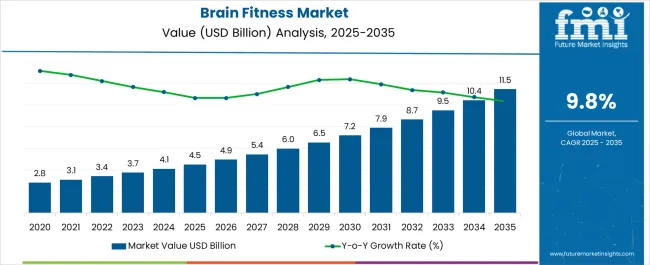
| Metric | Value |
|---|---|
| Brain Fitness Market Estimated Value in (2025 E) | USD 4.5 billion |
| Brain Fitness Market Forecast Value in (2035 F) | USD 11.5 billion |
| Forecast CAGR (2025 to 2035) | 9.8% |
The Brain Fitness market is experiencing notable growth driven by rising awareness of cognitive health, the increasing prevalence of age-related cognitive decline, and the growing adoption of digital health solutions. In 2025, the market is being supported by innovations in neurotechnology and software-based brain training programs that enhance memory, attention, and problem-solving skills. Investments in healthcare infrastructure, coupled with the integration of AI and analytics into brain fitness solutions, are enabling scalable and personalized training programs.
Rising demand from hospitals, clinics, and wellness centers is further fostering market expansion, as institutions seek solutions to improve patient outcomes and support preventive healthcare initiatives. Moreover, the growing emphasis on mental wellness and cognitive performance in corporate and educational environments is creating additional avenues for adoption.
The market outlook is being positively influenced by the convergence of hardware, software, and data-driven brain training platforms, which facilitate remote monitoring, real-time progress tracking, and adaptive learning programs tailored to individual needs With continued technological innovation and increasing healthcare awareness, the Brain Fitness market is poised for sustained growth across multiple end-user segments.
The brain fitness market is segmented by type, product, end users, and geographic regions. By type, brain fitness market is divided into Biofeedback Brain Fitness Training, Cognitive Brain Fitness Training, Visual Brain Fitness Training, and Others. In terms of product, brain fitness market is classified into Software, Brain Training Tools, and Others. Based on end users, brain fitness market is segmented into Hospitals, Wellness Clinics, and Others. Regionally, the brain fitness industry is classified into North America, Latin America, Western Europe, Eastern Europe, Balkan & Baltic Countries, Russia & Belarus, Central Asia, East Asia, South Asia & Pacific, and the Middle East & Africa.
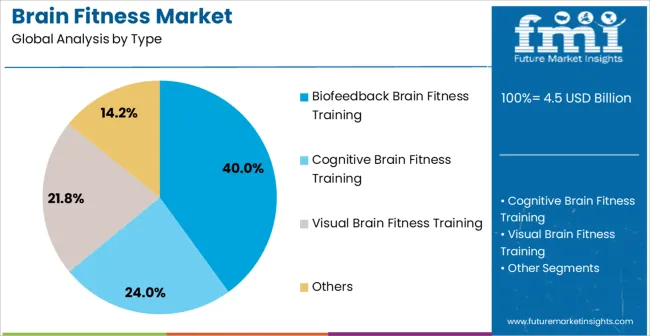
The Biofeedback Brain Fitness Training segment is projected to hold 40.00% of the market revenue in 2025, making it the leading product type. This dominance is being attributed to its ability to provide real-time physiological feedback, which enhances the efficacy of cognitive training programs.
Adoption has been accelerated by increasing use in clinical and preventive healthcare settings, where measurable cognitive improvement and patient engagement are highly valued. Biofeedback platforms allow adaptive exercises that adjust to individual performance, thereby improving attention, memory, and stress management outcomes.
The segment’s growth is further supported by the integration of wearable sensors, neurofeedback devices, and software-driven training algorithms, which enable scalable and personalized brain fitness programs As healthcare providers increasingly focus on preventive and cognitive wellness programs, biofeedback-based training has emerged as the preferred choice due to its demonstrated effectiveness, ease of integration into clinical workflows, and ability to provide quantifiable cognitive performance metrics.
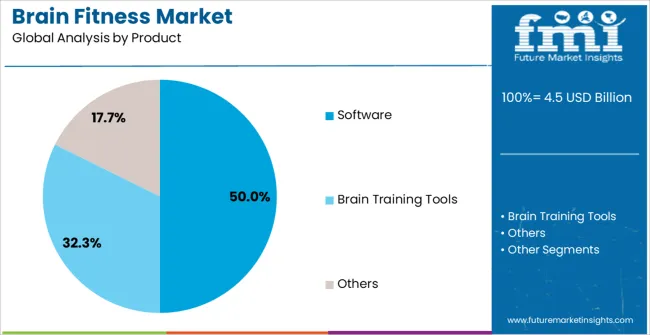
The Software segment is expected to account for 50.00% of the market revenue in 2025, emerging as the dominant product platform. This leadership is being driven by the scalability, flexibility, and cost-effectiveness offered by software-based brain fitness solutions. Digital platforms allow users to access personalized cognitive training exercises, track progress, and receive adaptive interventions without requiring extensive hardware deployment.
The growth of this segment has been supported by increasing adoption in hospitals, educational institutions, and corporate wellness programs, where remote accessibility and data analytics are highly valued. Software-based solutions also enable integration with mobile devices, cloud services, and AI-powered algorithms to enhance user engagement and cognitive outcomes.
The ongoing focus on mental health and performance optimization is further encouraging the adoption of software-driven platforms, which provide continuous updates, performance tracking, and customizable training programs These factors collectively contribute to the segment’s leading market position.
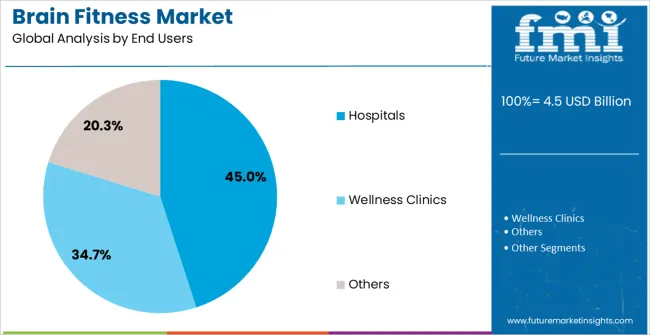
The Hospitals end-user segment is anticipated to hold 45.00% of the market revenue in 2025, positioning it as the largest adoption sector. This prominence is being driven by increasing institutional focus on preventive healthcare, rehabilitation, and cognitive wellness programs. Hospitals are leveraging brain fitness solutions to support patients with age-related cognitive decline, neurological disorders, and mental wellness needs, while also promoting proactive health interventions.
The growth of this segment has been supported by the integration of advanced neurofeedback, software-driven cognitive assessments, and adaptive training programs into hospital services. Hospitals benefit from the ability to offer structured brain fitness programs with measurable outcomes, which enhance patient satisfaction and clinical efficiency.
Furthermore, rising investments in healthcare infrastructure and the adoption of digital health technologies have facilitated the deployment of scalable brain fitness platforms within hospital settings As healthcare providers increasingly recognize the importance of cognitive health and preventive interventions, the hospital segment is expected to maintain leadership in market revenue share.
It has been reported that the brain slowly deteriorates as a person ages with the senses, memory and cognitive thinking abilities being affected the most. The deterioration of functions of the brain was explained by the loss of brain plasticity.
Brain plasticity is the capacity of the nervous system to change its neural structure in reaction to environmental challenges. However research conducted in the last few years revealed that the brain retains the ability undergoe changes in size and shape in response to stimulation.
Brain fitness is an umbrella term for techniques and strategies such as mental and cognitive training, neuroplasticity, neurogenesis, brain vascularization and others which are useful in keeping the brain fit. These are a set of mental exercises to sharpen the senses, memory and attention.
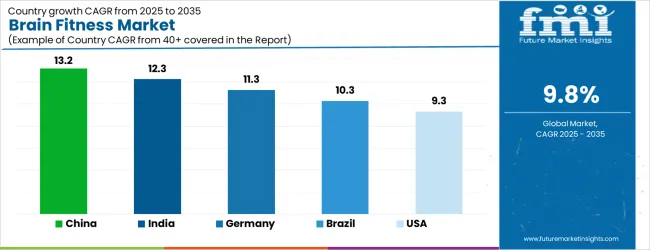
| Country | CAGR |
|---|---|
| China | 13.2% |
| India | 12.3% |
| Germany | 11.3% |
| Brazil | 10.3% |
| USA | 9.3% |
| UK | 8.3% |
| Japan | 7.4% |
The Brain Fitness Market is expected to register a CAGR of 9.8% during the forecast period, exhibiting varied country level momentum. China leads with the highest CAGR of 13.2%, followed by India at 12.3%. Developed markets such as Germany, France, and the UK continue to expand steadily, while the USA is likely to grow at consistent rates. Japan posts the lowest CAGR at 7.4%, yet still underscores a broadly positive trajectory for the global Brain Fitness Market. In 2024, Germany held a dominant revenue in the Western Europe market and is expected to grow with a CAGR of 11.3%. The USA Brain Fitness Market is estimated to be valued at USD 1.7 billion in 2025 and is anticipated to reach a valuation of USD 1.7 billion by 2035. Sales are projected to rise at a CAGR of 0.0% over the forecast period between 2025 and 2035. While Japan and South Korea markets are estimated to be valued at USD 232.8 million and USD 115.6 million respectively in 2025.
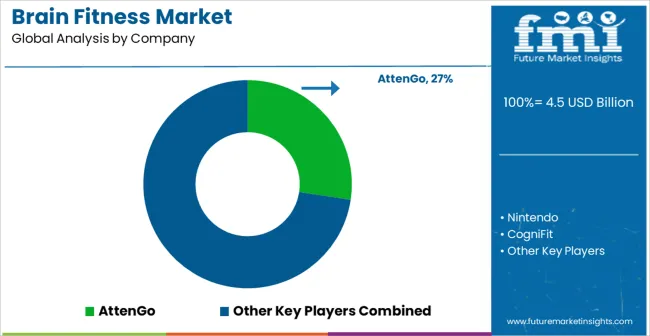
| Item | Value |
|---|---|
| Quantitative Units | USD 4.5 Billion |
| Type | Biofeedback Brain Fitness Training, Cognitive Brain Fitness Training, Visual Brain Fitness Training, and Others |
| Product | Software, Brain Training Tools, and Others |
| End Users | Hospitals, Wellness Clinics, and Others |
| Regions Covered | North America, Europe, Asia-Pacific, Latin America, Middle East & Africa |
| Country Covered | United States, Canada, Germany, France, United Kingdom, China, Japan, India, Brazil, South Africa |
| Key Companies Profiled | AttenGo, Nintendo, CogniFit, NEEURO, BrainTrain, SMARTfit, Applied Cognitive Engineering, and Lumos Labs |
The global brain fitness market is estimated to be valued at USD 4.5 billion in 2025.
The market size for the brain fitness market is projected to reach USD 11.5 billion by 2035.
The brain fitness market is expected to grow at a 9.8% CAGR between 2025 and 2035.
The key product types in brain fitness market are biofeedback brain fitness training, cognitive brain fitness training, visual brain fitness training and others.
In terms of product, software segment to command 50.0% share in the brain fitness market in 2025.






Full Research Suite comprises of:
Market outlook & trends analysis
Interviews & case studies
Strategic recommendations
Vendor profiles & capabilities analysis
5-year forecasts
8 regions and 60+ country-level data splits
Market segment data splits
12 months of continuous data updates
DELIVERED AS:
PDF EXCEL ONLINE
Brain Monitoring Market Size and Share Forecast Outlook 2025 to 2035
Brain Computing Interfaces Market Size and Share Forecast Outlook 2025 to 2035
Brain Cancer Diagnostics Market Size and Share Forecast Outlook 2025 to 2035
Brain Metastasis Therapeutics Market Analysis - Size, Share, and Forecast Outlook 2025 to 2035
Brain-Computer Interface Implant Market Analysis Size and Share Forecast Outlook 2025 to 2035
Brain Implants Market Size and Share Forecast Outlook 2025 to 2035
Brain Imaging and Neuroimaging Market Size and Share Forecast Outlook 2025 to 2035
Brain Health Supplement Market Analysis - Size, Share, and Forecast Outlook 2025 to 2035
Brain Tumor Treatment Market Analysis-- Size and Share Forecast Outlook 2025 to 2035
Brain Biomarker Market Trends and Forecast 2025 to 2035
Brain Tumor Drugs Market Forecast & Analysis: 2025 to 2035
Brain Mint Market Analysis by Functionality, Consumer Orientation, Sales Channel and Region Through 2035
Brain Monitoring Systems Market is segmented by Lateral Flow Readers and Kits and Reagents from 2025 to 2035
Brain Fingerprinting Technology Market
Deep Brain Stimulator Market Size and Share Forecast Outlook 2025 to 2035
Kids’ Brain Health Supplements Market Size and Share Forecast Outlook 2025 to 2035
Bovine Brain Extract Size and Share Forecast Outlook 2025 to 2035
Chronic Brain Damage Treatment: Trends, Growth, and Key Developments
Auditory Brainstem Response Analyzers Market Size and Share Forecast Outlook 2025 to 2035
Wireless Brain Sensors Market

Thank you!
You will receive an email from our Business Development Manager. Please be sure to check your SPAM/JUNK folder too.
Chat With
MaRIA